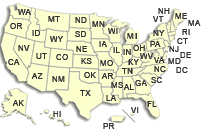Effects of urbanization on stream ecosystems
Proceedings of the 1st annual Stormwater Management Research Symposium, Stormwater Management Academy, Orland, Fl. October 12-13th
by J.L. Smoot, T.F. Cuffney, and W.L. Bryant, Jr.
Abstract
Studies on the effects of urbanization on stream ecosystems have evolved from documenting
impacts to attempting to understand the driving factors responsible for stream conditions. In
1999, the U.S. Geological Survey's National Water-Quality Assessment Program initiated a
series of pilot studies to assess the effects of urbanization on physical habitat, biotic assemblages
(algal, fish, invertebrate), and water chemistry. The relations among varying intensities of basin
urbanization and stream ecology were investigated in three metropolitan areas of the United
States: the humid Northeast around Boston, Massachusetts, the humid Southeast around
Birmingham, Alabama, and the semiarid West around Salt Lake City, Utah. Of the 28 physical
variables describing channel morphology, hydraulic properties, and streambed conditions
examined, none were significantly correlated with urbanization intensity in all three study areas.
Urbanization effects on stream habitat were less apparent for streams in Salt Lake City and
Birmingham due to influence of basin slope (Salt Lake City) and climate (drought in Alabama)
on modifying hydrology of streams. In urban streams, the relative abundance of pollutiontolerant
algal species was higher than in the less impacted streams. Of the various structural
attributes of the algal assemblages investigated, species composition changed along gradients of
urban intensity in a more consistent manner than algal biomass or diversity. Fish species
richness decreased significantly with increasing urbanization in Birmingham and Boston (fish
were not sampled in Salt Lake City due to low native diversity). Percent endemic species
richness decreased significantly with increasing urbanization only in Birmingham, whereas
percent fluvial specialist species decreased significantly with increasing urbanization only in
Boston. Nearly linear patterns (no threshold response) were observed in Birmingham. Threshold
responses were observed in Boston, with periodic increases and decreases in species richness
along the urban gradient. Invertebrate communities exhibited similar and strong responses to
urbanization in Boston and Birmingham. Although responses were evident in Salt Lake City,
they were confounded by extensive hydrologic modifications in the basin and a strong elevation
gradient associated with development along the Wasatch Range. Effect thresholds for
invertebrate assemblages at 5-18% total impervious surface area have been reported previously,
however, the results did not indicate that an effect threshold exists at low levels of urbanization.
Complete proceedings report is available through the ALBE NAWQA pages.
Citation:
Smoot, J.L., Cuffney, T.F., and Bryant, Jr., W.L., 2004, Effects of urbanization on stream ecosystems: Proceedings of the 1st annual Stormwater Management Research Symposium, Stormwater Management Academy, Orland, Fl. October 12-13th., pp 127-136.
|
